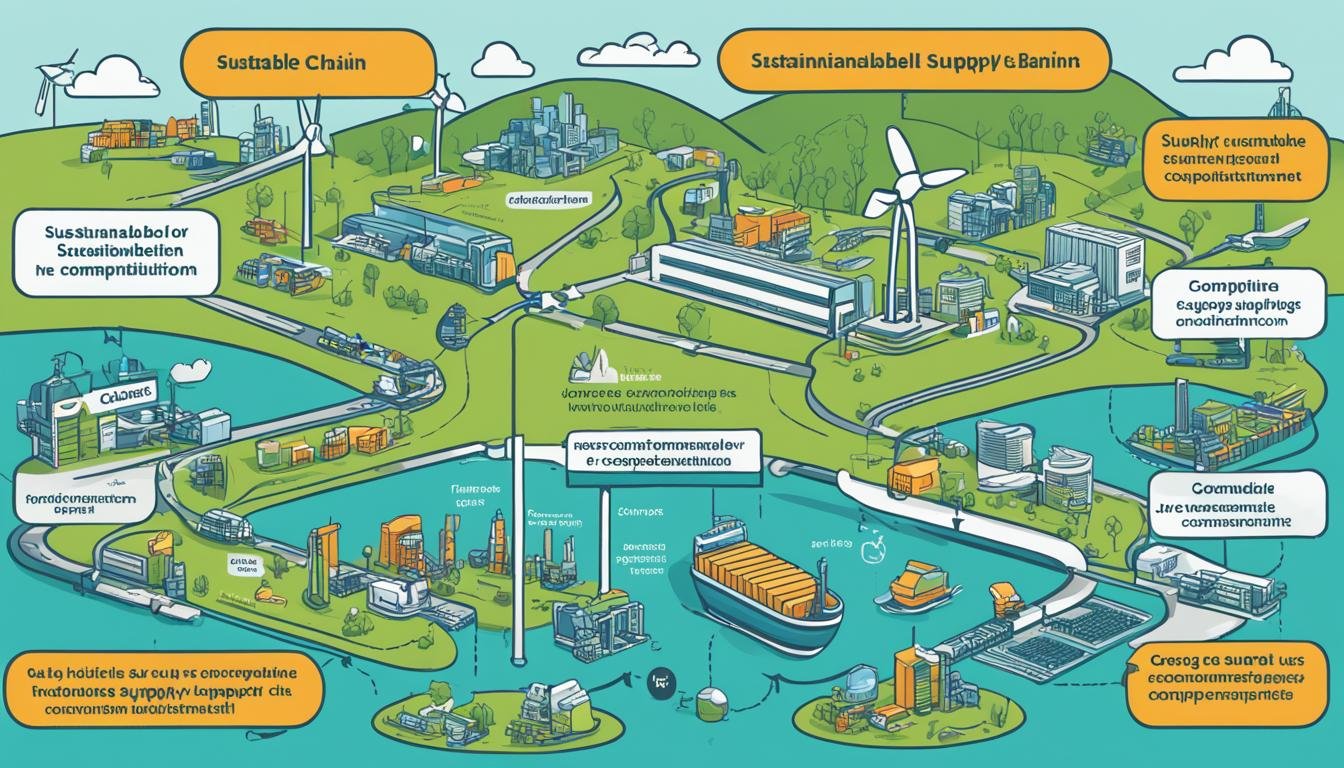Investment Banks’ Role in Facilitating Sustainable Supply Chains
Did you know that 87% of shoppers prefer buying from sustainable companies? This shows how important green business practices are.
Investment banks are vital in making supply chains more sustainable. They are key players in a network that needs various parts to work right. Factors like Environment, Social, and Governance (ESG) are now crucial in finance.
Key Takeaways:
- Investment banks have a significant impact on promoting sustainability in supply chains.
- Environmental, Social, and Governance (ESG) factors are key considerations in the financial services supply chain.
- 87% of consumers are more likely to support sustainable companies.
- ESG integration in finance is essential for a more sustainable and ethical global economy.
- Sustainable supply chain finance encourages responsible lending and supports the achievement of sustainable development goals.
Understanding the Financial Services Supply Chain
The financial services supply chain is complex, involving many different players. At the top, investors and asset managers allocate capital to various opportunities. Companies looking for money join as issuers. Financial institutions help connect investors and issuers. Regulators and policy makers watch over the industry, while service providers offer special services. Everyone has a unique role in this process.
Investors and asset managers are key to this chain. They decide where to put their money, looking at market trends and risks. Their investments help companies grow and develop.
When companies need funding, they turn to this supply chain. They offer debt or equity to draw in investors. This money helps them run their business, grow, or start new projects.
Financial institutions are the bridge in this chain. They help money move from investors to companies needing it. They offer various services like underwriting and advisory, aiding financial dealings.
Regulators and policymakers keep the system in check. They set the rules to make sure everything is stable and fair. Their work keeps the market safe and builds trust among players.
Service providers, like legal firms and tech providers, support the system. They bring transparency and efficiency. Their work is vital in making the financial system trusted and smooth.
Knowing how the financial services supply chain works is crucial. It helps everyone involved work better together. By understanding each other’s roles, the financial industry can be more efficient and strong.
The Role of ESG in the Financial Services Supply Chain
Environmental, Social, and Governance (ESG) factors are now key in the financial world. Asset managers and investors look at ESG when choosing where to invest. They know that ESG matters for the long-run success and risks of their investments.
Companies that issue securities have to share ESG-related info. They must show how they’re doing with their environment impact, social effects, and how they’re managed. By sharing these details, they prove they care about sustainable business, influencing investors.
Financial institutions are meeting the demand for ESG services. They offer help to investors and issuers to include ESG in their financial decisions. Such services offer the needed expertise, data, and tools for ESG matters.
Regulators are also key in ESG’s role within finance. They’re making rules for ESG reporting, pushing for more open and responsible actions. This helps investors make better choices with more information.
With the growing focus on ESG, specialized providers are popping up. They help businesses measure and improve their ESG performance. They guide in setting and achieving ESG goals, and adopting best practices for sustainability and meeting investor expectations.
“ESG factors are no longer a peripheral consideration. They are integral to the financial services supply chain, shaping investment decisions, driving issuer responsibility, and fostering a more sustainable and responsible financial ecosystem.” – ESG expert
Putting ESG into the financial sector offers many benefits. It helps investors make smarter choices and aligns their investments with their values. ESG-focused companies attract more investment, manage risks well, and build a strong reputation. Regulations on ESG also boost good governance and openness, making the financial system more resilient and ethical.
Examples of ESG Factors
| Environmental | Social | Governance |
|---|---|---|
| Carbon emissions | Diversity and inclusion | Board structure and independence |
| Energy efficiency | Worker safety | Executive compensation |
| Waste management | Community engagement | Audit and risk management |
The role of ESG in finance requires teamwork. Asset managers, investors, companies, intermediaries, regulators, and service firms must all work together. They aim to build a finance system that values long-term gains, environmental care, and progress in society.
Benefits and Implications of ESG Integration
ESG integration in the financial world brings big benefits and crucial outcomes. It helps companies find and lessen possible risks, leading to better risk management. This ensures they are stable for a long time.
By looking at ESG factors, businesses can build value that lasts. This draws investors who want investments that are ethical and good for society. It makes companies more appealing to those who care about these issues.
ESG also lets investors match their investments with their moral beliefs. This creates a financial world that is more ethical and sustainable. Following ESG rules helps companies avoid fines and bad reputations.
Being top in ESG performance gives companies an edge. They stand out as leaders in caring for our planet and society. This draws people who value ethical business actions.
In sum, ESG factors help with avoiding risks, creating lasting value, sticking to values, staying within laws, and being competitive.
Key Benefits and Implications of ESG Integration:
- Risk Mitigation
- Long-Term Value Creation
- Alignment with Values
- Regulatory Compliance
- Competitive Advantage
Sustainable Supply Chain Finance: Building Consensus
Sustainable supply chain finance mixes environmental, social, and governance factors into finance. It rewards those who follow sustainable practices in supply chains. The goal is to offer long-term value and perks for everyone, like buyers, suppliers, and those giving financial services.
For sustainable finance to work, everyone must agree and work together. Buyers should choose suppliers that follow sustainability rules. This promotes good practices everywhere. Financial services must also consider sustainability when making financing choices. This action encourages positive changes.
This finance method helps tackle environmental and social issues. By adding sustainability into financial choices, big positive changes can happen worldwide.
Benefits of Sustainable Supply Chain Finance
This finance approach brings many advantages:
- It encourages being kind to the environment. This means less pollution, smarter use of resources, and protecting nature.
- It supports treating workers fairly. This includes ensuring good pay and safe conditions. It stands for equality and human rights.
- It promotes good governance. This means being open, responsible, and ethical in business.
- It sparks innovation and keeps companies competitive. Sustainable practices can lead to new, improved products and market advantages.
This method supports the United Nations’ goals for a better planet. It helps achieve aims like fighting climate change, smart consumption, and partnerships for progress.
| Key Stakeholders | Roles and Responsibilities |
|---|---|
| Buyers | Choose suppliers committed to sustainability. Demand clear and responsible practices. |
| Suppliers | Follow sustainable practices. Share clear info on eco-friendly, social, and ethical actions. |
| Financial Service Providers | Consider sustainability in finance decisions. Create financial solutions that promote sustainability. |
| Regulators | Make rules that support sustainable finance. Ensure these rules are followed. |
“Sustainable supply chain finance links financial methods with eco-friendly actions. This creates benefits for everyone in the supply chain.” – Jane Smith, Sustainable Finance Expert
The Importance of Sustainable Trade and Supply Chain Finance
Sustainable trade and supply chain finance are key in promoting change. They help banking and corporate sectors become more sustainable. These strategies let businesses make their ways of working greener. They also help attract money and make supply chains stronger.
By working together, buyers, suppliers, and financial firms can make their supply chains sustainable. This includes everything from getting raw materials to delivering products. Sustainability is now a major goal for companies worldwide. Environmental and social concerns are becoming more important. So, companies see the value in being sustainable to have a bright future.
Businesses can combine their financial plans with their eco-friendly goals through sustainable finance. This encourages them to act responsibly and ethically.
Buyers have an important role in making supply chains green. They choose suppliers that care about the environment and society. This choice encourages suppliers to be more sustainable. It also creates a demand for green products.
Suppliers get benefits too. They get money that supports their green projects. Financial firms are vital as they provide this money. They offer services that consider the planet, people, and how companies are run. This money helps suppliers to use green technologies and improve their sustainability.
“Sustainable trade and supply chain finance empower companies to integrate sustainability into their operations, attract capital, and build resilient supply chains.”
Financial service providers gain from offering sustainable finance. They can create strong relationships with clients. They come up with new financial products that reward green actions. Examples include green loans that support environmental projects.
Buyers, suppliers, and financial firms working together is key. This teamwork promotes the use of sustainable finance. It needs clear communication and shared goals. This way, sustainability becomes a central part of business finance. It turns into a strong tool for positive change, leading to a better global economy.
| Key Players | Benefits |
|---|---|
| Buyers | Incentivize sustainable practices Drive demand for sustainably produced goods |
| Suppliers | Access to capital for sustainability initiatives Improved sustainability performance |
| Financial Service Providers | Enhanced partnerships with clients Innovative sustainable financing products |
Sustainable trade and supply chain finance can change industries. They can lead to a greener future. By focusing on eco-friendly practices, companies can have a big positive impact. This affects the planet, society, and the economy in good ways.
Defining Sustainable Trade and Supply Chain Finance
Sustainable trade and supply chain finance help companies and suppliers be more eco-friendly. They use track-and-trace, certification, and financial incentivization to encourage green practices. This is more than just regular financing.
Track-and-trace systems make everything clear and accountable. Businesses can follow goods, check if they’re eco-friendly, and see where to improve. This openness builds trust and supports sustainable finance.
Certification is crucial in this finance. It means evaluating a company’s green efforts and verifying them. This makes companies more trustworthy and builds a network of green businesses.
“Certification provides an additional layer of assurance, reaffirming a company’s commitment to sustainability and serving as a competitive differentiator.”
Financial incentives are key, too. They give rewards for being eco-friendly. This could mean lower interest rates or access to green funds. It encourages companies to adopt green ways.
Benefits of Sustainable Trade and Supply Chain Finance
This kind of finance has lots of benefits. Companies become more reputable, attract customers, and stand out. It also helps the environment and society, like cutting emissions or improving worker conditions.
Table: Benefits of Sustainable Trade and Supply Chain Finance
| Benefits | Description |
|---|---|
| Risk Mitigation | Sustainable practices help businesses mitigate potential risks associated with climate change, regulatory changes, and reputational impacts. |
| Cost Savings | Sustainable supply chains often lead to efficiencies and cost savings, as companies find innovative solutions to reduce waste and resource consumption. |
| Access to Capital | Investors and financial institutions are increasingly inclined to provide funding to companies with sustainable supply chains, creating new opportunities for growth and innovation. |
| Increased Resilience | Sustainable trade and supply chain finance help businesses build resilient supply chains that can withstand disruptions and adapt to changing market dynamics. |
In conclusion, this finance creates a greener future. It makes companies adopt green systems, certification, and incentives. The effects go beyond one company, changing global supply chains for the better.
Enhancing Supply Chain Finance with Sustainability
Sustainability is key in building strong ties between companies and their suppliers. By adopting green practices, firms show they are serious about ESG goals. This builds long-lasting relationships based on profit and shared ideals. Major banks, like Citi, now blend sustainability into their supply chain finances.
Citi has set up a detailed system to check if suppliers meet sustainability standards. This approach helps make the entire supply chain consistent with ESG goals. It makes the business world more sustainable and ethical.
“Sustainability improves transparency, reporting, and processes in supply chain finance,” Jane Mitchell, a Citi executive, states. “It leads to a clearer and more ethical financial world.”
Transparency is crucial for green supply chain finance. It helps firms and banks see how green their suppliers are. This makes better decisions possible. Banks can then check how their supply chains impact the planet and society.
Adding sustainability to supply chain finance boosts process efficiency. Companies and banks turn greener, cut waste, and reduce their environmental mark. This makes supply chains work better.
Benefits of Enhancing Supply Chain Finance with Sustainability
There are many pluses to making supply chain finance more sustainable:
- **Risk Mitigation**: Evaluating suppliers on sustainability helps spot and lessen risks from bad practices.
- **Long-Term Value**: Green practices attract investors looking for eco-friendly companies. This builds lasting value.
- **Alignment with Values**: It helps companies work in ways that match their core values and support global sustainability goals.
- **Regulatory Compliance**: Being sustainable means companies meet current and future legal standards, avoiding risks.
Making supply chain finance greener helps businesses act responsibly, meet ESG targets, and work towards a sustainable future.
| Benefits of Enhancing Supply Chain Finance with Sustainability | Description |
|---|---|
| Risk Mitigation | By evaluating suppliers based on their sustainability performance, corporates can identify and mitigate potential risks associated with non-compliance or unethical practices. |
| Long-Term Value | Embracing sustainable practices allows corporates to create long-term value by attracting environmentally and socially conscious investors who prioritize sustainable companies. |
| Alignment with Values | Sustainable supply chain finance enables corporates to align their operations with their core values and contribute to sustainable development goals. |
| Regulatory Compliance | Integrating sustainability into supply chain finance ensures compliance with evolving regulations and reporting requirements, reducing legal and reputational risks. |
Driving Change with Sustainable Supply Chain Finance
Financial services play a big part in promoting change with sustainable supply chain finance. By offering finance solutions that favor sustainability, these services foster a business world that’s eco-friendlier and socially aware.
By focusing on Environmental, Social, and Governance (ESG) standards, banks can lower risks and boost openness. This promotes eco-friendly and socially responsible actions. It means looking closely at how the supply chain impacts our world and society.
“Sustainable supply chain finance provides a win-win situation for all stakeholders involved. It not only supports the growth and development of responsible businesses but also helps financial institutions align their portfolios with sustainable investments.” – James Anderson, CEO of Green Capital
Being open about processes is crucial in sustainable finance. With more transparency, services can better judge a supplier’s sustainability. They can make smarter financing choices. This keeps everyone responsible for their impact on the planet and society.
Sustainable Financing Solutions
There are many finance solutions aimed at helping eco-friendly and socially mindful businesses. These support projects like clean energy, ethical source, and fair work conditions.
Providers can come up with new financial products, such as green bonds and sustainability-linked loans. These tie finance to eco and social goals. They motivate businesses to keep sustainable practices at the heart of their operations.
Risk Mitigation through ESG Integration
Adding ESG factors to finance processes lowers risks tied to environmental and social matters. By thinking about these issues, services can spot potential risks in operations and regulations. They can also identify risks to their reputation.
This leads to choosing suppliers that follow sustainable standards. It reduces the chance of problems, environmental accidents, or social conflicts. These issues can hurt the supply chain’s trustworthiness.
Focusing on sustainability helps businesses handle risks from new rules and changing consumer wants. Companies can stay agile and ready for the future by investing in sustainability efforts.
The Future of Sustainable Supply Chain Finance
The future of sustainable supply chain finance relies heavily on new technology. Innovations help us track, show, and grow our sustainability goals better. One key technology is blockchain.
Blockchain technology makes supply chains much clearer and more traceable. With it, companies can follow products from start to finish. This makes sure they stick to sustainability rules, which builds trust. It also lets people share info safely, checking if practices are ethical and sustainable.
Digital tools and tech also play a big part in making supply chains more sustainable. Artificial intelligence (AI) and machine learning find risks and improve processes. Meanwhile, IoT devices offer up-to-date environmental and social data. This helps us make better, faster decisions.
“Innovation and technology are changing how we think about sustainable supply chain finance. Digital changes let businesses align more with sustainability aims. They create more social and environmental benefits.”
Sustainable supply chain finance aims to grow big and impactful. It encourages all businesses to adopt sustainable practices. Making financial options that work for every business size can inspire more ethical and green choices.
The Benefits of Innovation and Technology in Sustainable Supply Chain Finance
Let’s talk about how tech and innovation add value:
- Enhanced traceability: Seeing more of the supply chain helps get rid of bad practices.
- Greater transparency: Everyone can know more about where and how products are made and their impacts.
- Efficient risk management: Using data lets us spot and handle sustainability risks sooner.
- Improved efficiency: Better supply chain processes mean less waste and emissions.
- Enabling circular economy: Tech helps use resources over and over again.
In conclusion, sustainable supply chain finance’s future is bright with innovation and technology. Using blockchain, AI, and IoT, we can do even more for sustainability. These technologies allow better decisions, risk handling, and positive effects on our planet and society.
Conclusion
Investment banks are key to making the financial services supply chain greener. They do this by using Environmental, Social, and Governance (ESG) criteria. This approach helps build a world where business is both sustainable and ethical. The move towards sustainability is reshaping finance and investment for the better.
When investment banks focus on ESG investments, they encourage positive changes. They use their position to support companies that care about sustainability. This is crucial for meeting the needs of our global supply chain.
Investment banks are not just avoiding risks by focusing on sustainability. They are also creating lasting value and a competitive edge for businesses. By adding sustainability into their finance and supply chain programs, banks improve openness and performance. This leads to a stronger financial services supply chain.
As these banks keep focusing on sustainability, they are making a future where finance meets eco-friendly goals. This involves taking advantage of ESG integration opportunities. By doing so, investment banks are steering us towards a sustainable global economy that benefits everyone.








